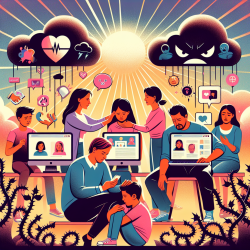The use of mobile health (mHealth) technology in pediatric speech-language pathology (SLP) is an emerging field that offers numerous potential benefits. The study titled "Pediatric Speech-Language Pathologists’ Use of Mobile Health Technology: Qualitative Questionnaire Study" provides valuable insights into how pediatric SLPs are currently utilizing mobile apps, the barriers they face, and their desires for future technological advancements. This blog will discuss key findings from the study and suggest practical steps for practitioners to enhance their clinical practice through the integration of mHealth technology.
Current Utilization of mHealth Technology
According to the study, a significant majority of pediatric SLPs (83.1%) reported using technology in their clinical work, although most used it less than 50% of the time. The primary uses of mobile apps were for intervention (36.1%), clinical information (21.8%), and parent education (13.7%). Despite these uses, there is a clear indication that technology is underutilized in assessments, with only 12% of SLPs using apps for this purpose.
Barriers to Adoption
The study identified several barriers to the adoption of mHealth technology:
- Cost (34.1%)
- Lack of an evidence base (26.7%)
- Concerns about increasing children's screen time
- Limited access to technology
Interestingly, age was not a significant factor in technology adoption, suggesting that both younger and older SLPs face similar challenges.
Desires for Future Technology
There is a strong desire among pediatric SLPs for more technology, particularly in areas such as:
- Assessment (23.1%)
- Parent education (22.2%)
- Data recording or viewing (21.0%)
SLPs expressed a need for apps that are evidence-based, cost-effective, and customizable to fit the needs of individual clients.
Practical Steps for Practitioners
Based on the study's findings, here are some practical steps for pediatric SLPs to enhance their clinical practice:
- Incorporate Evidence-Based Apps: Prioritize the use of apps that have been validated through research to ensure their effectiveness.
- Advocate for Funding: Seek funding opportunities or grants to offset the cost of high-quality apps.
- Focus on Parent Education: Utilize apps that can help educate parents, thereby extending the reach of therapy beyond the clinical setting.
- Explore Data Collection Tools: Implement apps that facilitate data collection and analysis to track progress and make data-driven decisions.
Conclusion
The integration of mHealth technology in pediatric speech-language pathology has the potential to significantly enhance clinical outcomes. By addressing barriers and focusing on evidence-based, cost-effective, and customizable solutions, pediatric SLPs can better serve their clients and improve overall therapy effectiveness.
To read the original research paper, please follow this link: Pediatric Speech-Language Pathologists’ Use of Mobile Health Technology: Qualitative Questionnaire Study










